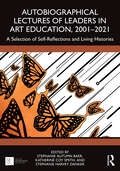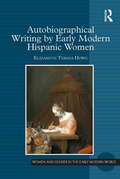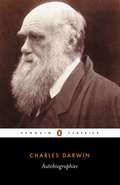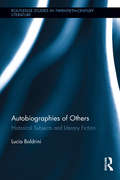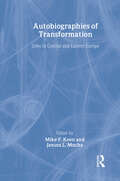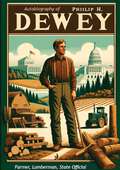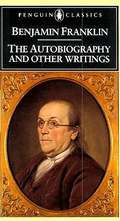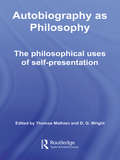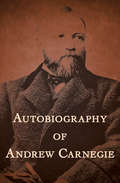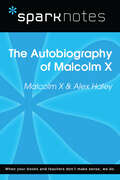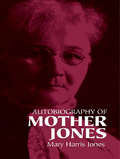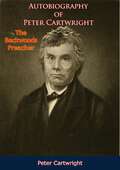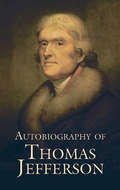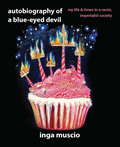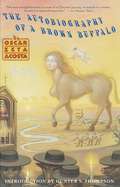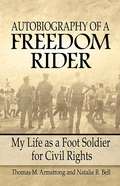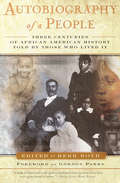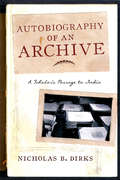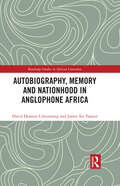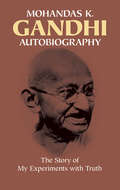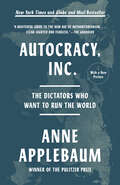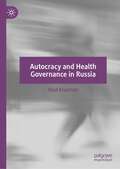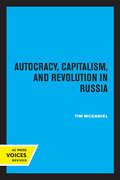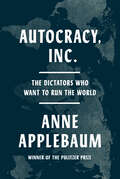- Table View
- List View
Autobiographical Lectures of Leaders in Art Education, 2001–2021: A Selection of Self-Reflections and Living Histories
by Stephanie Autumn Baer Katherine Coy Smith Stephanie Harvey DankerThis scholarly collection is a continuation of a lecture series highlighting the essential nature of biography in the history of art education. The editors feature 16 prominent art educators, organized into one of three chronological sections spanning the past two decades. The contributing art educators explore influences that shaped their beliefs about art education and the arts, describe their career paths, explain their philosophy of art education and its development, and advise, predict, or speculate about the future. Every chapter concludes with essential questions and instructional resources to guide readers in their reflection. In reading these lectures, art education faculty, students, and any adjacent professional to the arts and art history can learn the importance of biographical and autobiographical study to research. Beyond research, readers can use the lectures to consider and question teaching and mentoring relationships, the power of influence, and what qualities may contribute to the recognition of exemplary success for art educators.
Autobiographical Writing by Early Modern Hispanic Women
by Elizabeth Teresa HoweWomen’s life writing in general has too often been ignored, dismissed, or relegated to a separate category in those few studies of the genre that include it. The present work addresses these issues and offers a countervailing argument that focuses on the contributions of women writers to the study of autobiography in Spanish during the early modern period. There are, indeed, examples of autobiographical writing by women in Spain and its New World empire, evident as early as the fourteenth-century Memorias penned by Doña Leonor López de Cordóba and continuing through the seventeenth-century Cartas of Sor Juana Inés de la Cruz. What sets these accounts apart, the author shows, are the variety of forms adopted by each woman to tell her life and the circumstances in which she adapts her narrative to satisfy the presence of male critics-whether ecclesiastic or political, actual or imagined-who would dismiss or even alter her life story. Analyzing how each of these women viewed her life and, conversely, how their contemporaries-both male and female-received and sometimes edited her account, Howe reveals the tension in the texts between telling a ’life’ and telling a ’lie’.
Autobiographies
by Charles DarwinThe Autobiographies of Charles Darwin (1809-82) provide a fascinating glimpse into the mind of one of the world's intellectual giants. They begin with engaging memories of his childhood and youth and of his burgeoning scientific curiosity and love of the natural world, which led to him joining the expedition on the Beagle. Darwin follows this with survey of his career and ends with a reckoning of his life's work. Interspersed with these recollections are fascinating portraits - from his devoted wife Emma and his talented father, both bullying and kind, to the leading figures of the Victorian scientific world he counted among his friends, including Lyell and Huxley. Honest and illuminating, these memoirs reveal a man who was isolated by his controversial beliefs and whose towering achievements were attained by a life-long passion for the discoveries of science.
Autobiographies of Others: Historical Subjects and Literary Fiction (Routledge Studies in Twentieth-Century Literature)
by Lucia BoldriniIn this volume, Boldrini examines "heterobiography"—the first-person fictional account of a historic life. Boldrini shows that this mode is widely employed to reflect critically on the historical and philosophical understanding of the human; on individual identity; and on the power relationships that define the subject. In such texts, the grammatical first person becomes the site of an encounter, a stage where the relationships between historical, fictional and authorial subjectivities are played out and explored in the ‘double I’ of author and narrating historical character, of fictional narrator and historical person. Boldrini considers the ethical implications of assuming another’s first-person voice, and the fraught issue of authorial responsibility. Constructions of the body are examined in relation to the material evidence of the subject’s existence. Texts studied include Malouf’s An Imaginary Life, Carey’s True History of the Kelly Gang, Ondaatje’s The Collected Works of Billy the Kid, Adair’s The Death of the Author, Banti’s Artemisia, Vázquez Montalbán’s Autobiografía del general Franco. Also discussed, among others: Yourcenar’s Memoirs of Hadrian, Tabucchi’s The Last Three Days of Fernando Pessoa, Giménez-Bartlett’s Una habitación ajena (A Room of Someone Else’s).
Autobiographies of Transformation: Lives in Central and Eastern Europe (Studies in European Sociology)
by Mike F. Keen Janusz L. MuchaAutobiographies of Transformation is a completely unique history of sociology in Central and Eastern Europe in the post-Communist era. Through the autobiographies of ten key sociological witnesses from the region, the sociological imagination is turned upon itself, resulting in a compelling and revealing account of the struggles, triumphs, and continuing challenges faced. The sociologists examined fall into three cohorts: early, mid and late career. As participants, each of the sociologists included has witnessed the intersection of history and biography in Central and Eastern Europe. As sociologists, they have tried, and continue to try, to connect the two so that they and their fellow citizens may better understand their circumstances and the futures that may follow. This revealing book, ideal for students and researchers of sociology, and Central and Eastern Europe studies, provides powerful and compelling autobiographical accounts, relating them to the current interest in this area's transformation.
Autobiography
by Bertrand RussellBertrand Russell remains one of the greatest philosophers and most complex and controversial figures of the twentieth century. Here, in this frank, humorous and decidedly charming autobiography, Russell offers readers the story of his life - introducing the people, events and influences that shaped the man he was to become. Originally published in three volumes in the late 1960s, Autobiography by Bertrand Russell is a revealing recollection of a truly extraordinary life written with the vivid freshness and clarity that has made Bertrand Russell's writings so distinctively his own.
Autobiography Of Philip H. Dewey; Farmer, Lumberman, State Official
by Philip H DeweyStep into the life of Philip H. Dewey with his compelling memoir, Autobiography of Philip H. Dewey: Farmer, Lumberman, State Official. This engaging autobiography offers a firsthand account of Dewey’s multifaceted life, providing readers with a rich tapestry of personal anecdotes, professional achievements, and historical insights.Philip H. Dewey’s life journey is a quintessential American story, reflecting the values of hard work, determination, and public service. From his early days as a farmer navigating the challenges of rural life to his ventures into the lumber industry, Dewey's narrative captures the spirit of entrepreneurship and resilience. His experiences in the lumber trade highlight the industry's significance in shaping local economies and the broader American landscape during his era.Throughout the autobiography, Dewey’s vivid storytelling brings to life the people, places, and events that shaped his journey. His narrative is enriched with historical context, offering readers a window into the socio-economic conditions and cultural milieu of his times. Dewey’s memoir is not only a personal chronicle but also a historical document that captures the evolution of American society through the lens of an individual’s experiences.Autobiography of Philip H. Dewey is an essential read for history enthusiasts, students of American studies, and anyone interested in the personal stories behind the nation’s development. Dewey’s candid and heartfelt account inspires and informs, celebrating the enduring values of hard work, dedication, and service.Join Philip H. Dewey on a journey through a life well-lived, and discover the remarkable story of a farmer, lumberman, and state official who made a lasting impact on his community and beyond. This autobiography is a testament to the power of perseverance and the enduring importance of contributing to the greater good.
Autobiography and Other Writings
by Benjamin FranklinBenjamin Franklin's writings represent a long career of literary, scientific, and political efforts over a lifetime which extended nearly the entire eighteenth century. Franklin's achievements range from inventing the lightning rod to publishing Poor Richard's Almanack to signing the Declaration of Independence. In his own lifetime he knew prominence not only in America but in Britain and France as well. This volume includes Franklin's reflections on such diverse questions as philosophy and religion, social status, electricity, American national characteristics, war, and the status of women. Nearly sixty years separate the earliest writings from the latest, an interval during which Franklin was continually balancing between the puritan values of his upbringing and the modern American world to which his career served as prologue. This edition provides a new text of the Autobiography, established with close reference to Franklin's original manuscript. It also includes a new transcription of the 1726 journal, and several pieces which have recently been identified as Franklin's own work.
Autobiography as Philosophy: The Philosophical Uses of Self-Presentation (Routledge Advances in the History of Philosophy #Vol. 2)
by D. G. Wright Thomas MathienMost philosophical writing is impersonal and argumentative, but many important philosophers have nevertheless written accounts of their own lives. Filling a gap in the market for a text focusing on autobiography as philosophy, this collection discusses several such autobiographies in the light of their authors' broader work, and considers whether there are any philosophical tasks for which life accounts are particularly appropriate. Instead of the common impersonal and argumentative forms of ordinary philosophical discussion, these autobiographical texts are deeply personal and largely narrative or explanatory. The contributors to this book examine the philosophical significance of philosophers’ autobiographies and whether or not there are broadly philosophical tasks for which this sort of writing is particularly suited. Autobiography as Philosophy contains a general discussion about the relation between philosophical and autobiographical writing, and essays on the specific writings of Augustine, Abelard, Montaigne, Descartes, Vico, Hume, Rousseau, Newman, Mill, Nietzsche, Collingwood and Russell by specialists on the works of these individuals. Original and distinctive in its efforts to think about the writings of historically recognized philosophers as communicative acts governed by their own distinctive interests and purposes, the book reveals that it is as much about the texts and the authors as it is about their doctrines and arguments. As a result the book steps back from many of the issues of substantive philosophical discussion to reflect on certain forms of writing as means to philosophical ends, to consider what those ends have included.
Autobiography of Andrew Carnegie: Large Print
by Andrew CarnegieA critically acclaimed autobiography by one of America's greatest philanthropists Scottish immigrant Andrew Carnegie worked his way up from bobbin boy to telegraph operator to railroad man, learning key lessons along the way that would eventually lead to his unparalleled success in the steel business. Documenting a world of tariffs, insider deals, and Wall Street sharks, The Autobiography of Andrew Carnegie opens a window into the great industrialist's decision-making process. His insights on education, business, and the necessity of giving back for the common good set an inspirational example for aspiring executives and provide a fitting testament to the power of the American dream. This ebook has been professionally proofread to ensure accuracy and readability on all devices.
Autobiography of Malcolm X (SparkNotes Literature Guide Series)
by SparkNotesAutobiography of Malcolm X (SparkNotes Literature Guide) by Malcolm X and Alex Haley Making the reading experience fun! Created by Harvard students for students everywhere, SparkNotes is a new breed of study guide: smarter, better, faster.Geared to what today's students need to know, SparkNotes provides:chapter-by-chapter analysis explanations of key themes, motifs, and symbols a review quiz and essay topicsLively and accessible, these guides are perfect for late-night studying and writing papers.
Autobiography of Mother Jones
by Mary Harris Jones Mary Field Parton Clarence DarrowAmong the most stirring works of labor history ever written, this autobiography of Mother Jones (née Mary Harris) chronicles the life of a woman who was considered a saint by many, and by others, "the most dangerous woman in America." A forceful and picturesque figure in the American labor movement of the late nineteenth and early twentieth centuries, Mother Jones was a born crusader.Widowed at the age of 30 when her husband and four young children died during a yellow fever epidemic, Mother Jones spoke out tirelessly and effectively for the rights of workers and unionists. She played a significant role in organizing mining strikes in West Virginia and Colorado, as well as the Pittsburgh steel strike of 1919. She was instrumental in the formation of the United Mine Workers union (UMW) in 1890 and the Industrial Workers of the World (IWW) in 1905.
Autobiography of Peter Cartwright,: The Backwoods Preacher
by Peter CartwrightWithout a formal education, equipped only with a Bible, hymnbook & a copy of the "Methodist Discipline" the outspoken, hellfire-brimstone preacher covered circuits on horseback through Kentucky, Tennessee, Ohio, Indiana, & Illinois for over 50 years, preaching more than 15 thousand sermons & personally baptizing over 12,000 converts. He became a member of the Illinois Legislature but lost to Abraham Lincoln in a race for Congress. He founded Illinois Wesleyan University. He knew God & understood men & issues. Many of his statements on the church, evangelism, slavery, cults, & theology were profound & some were prophetic. He had a burning heart for souls that drove him on often against incredible forces. He took on infidels, cultists, slave-owners, modernists, ruffians, Indians, heretics, tavern owners, & Jesuits with equal fervor & boldness.-Print ed.
Autobiography of Thomas Jefferson (Mobi Classics Series)
by Thomas JeffersonDuring his remarkable lifetime, Thomas Jefferson (1743–1826) served his country in many capacities — among them, as President of the United States. But ultimately, this great and talented man — an accomplished architect, naturalist, and linguist — wished to be remembered primarily as the author of the Declaration of Independence.In his autobiography, begun in 1821 at the age of 77, Jefferson presents a detailed account of his young life and the period during which he wrote the Declaration. A first draft of the document is included in this edition, as are his comments on the Articles of Confederation, his experiences as a wartime governor of Virginia, minister to France and observations during the French Revolution. Also featured here are rich remembrances and insights as Jefferson recalls his roles as Washington's secretary of state and vice president under John Adams, and his life in retirement.Fascinating as a trove of firsthand recollections by a pillar of American democracy, this highly recommended volume will be welcomed by students, scholars, and any reader interested in American history.
Autobiography of a Blue-eyed Devil
by Inga MuscioIn an updated second edition of her follow-up to the cult classic Cunt, Inga Muscio asserts that the history taught in schools and perpetuated in all areas of life in the US is, in fact, a marketing brand developed by powerful people to maintain gross inequities. With Autobiography of a Blue-Eyed Devil, it's Muscio's turn to take Americans on a tour through our history, from Columbus to today. Whose country is this? Has democracy ever really existed? With her trademark ability to deconstruct reality and expose truths that allow us to see our culture and ourselves more clearly, Muscio delves deep to answer these fundamental questions. Includ- ing chapters such as "God Told Me To Kill You," on religious intolerance from the 1600s to the 1800s, and "Postage Stamp Redemptions," in which she challenges the myth that White supremacy and imperialism in the US ended with the civil rights movement, Muscio offers new perspectives on our history that might shock even the most ardent alternative history buff.
Autobiography of a Brown Buffalo (Vintage International)
by Oscar Zeta AcostaBefore his mysterious disappearance and probable death in 1971, Oscar Zeta Acosta was famous as a Robin Hood Chicano layer and notorious as the real-life model for Hunter S. Thompson's "Dr. Gonzo," a fat, pugnacious attorney with a gargantuan appetite for food, drugs, and life on the edge. Written with uninhibited candor and manic energy, this book is Acosta's own account of coming of age as a Chicano in the psychedelic sixties, of taking on impossible cases while breaking all the rules of courtroom conduct, and of scrambling headlong in search of a personal and cultural identity.
Autobiography of a Freedom Rider: My Life as a Foot Soldier for Civil Rights
by Thomas Armstrong Natalie BellIn the segregated Deep South when lynching and Klansmen and Jim Crow laws ruled, there stood a line of foot soldiers ready to sacrifice their lives for the right to vote, to enter rooms marked "White Only," and to live with simple dignity. They were called Freedom Riders and Thomas M. Armstrong was one of them. This is his story as well as a look ahead at the work still to be done. June, 1961. Thomas M. Armstrong, determined to challenge segregated interstate bus travel in Mississippi, courageously walks into a Trailways bus station waiting room in Jackson. He is promptly arrested for his part in a strategic plan to gain national attention. The crime? Daring to share breathing space marked "Whites Only." Being of African-American descent in the Mississippi Deep South was literally a crime if you overstepped legal or even unspoken cultural bounds in 1961. The consequences of defying entrenched societal codes could result in brutal beatings, displacement, even murder with no recourse for justice in a corrupt political machine, thick with the grease of racial bias. The Freedom Rides were carefully orchestrated and included both black-and-white patriots devoted to the cause of de-segregation. Autobiography of a Freedom Rider details the strategies employed behind the scenes that resulted in a national spectacle of violence so stunning in Alabama and Mississippi that Robert Kennedy called in Federal marshals. Armstrong's burning need to create social change for his fellow black citizens provides the backdrop of this richly woven memoir that traces back to his great-grandparents as freed slaves, examines the history of the Civil Rights Movement, the devastating personal repercussions Armstrong endured for being a champion of those rights, the sweet taste of progressive advancement in the past 50 years, and a look ahead at the work still to be done. Hundreds were arrested for their part in the Freedom Rides, Thomas M. Armstrong amongst them. But it is the authors' quest to give homage to "the true heroes of the civil rights movement . . . the everyday black Southerners who confronted the laws of segregation under which they lived . . . the tens of thousands of us who took a chance with our lives when we decided that no longer would we accept the legacy of exclusion that had robbed our ancestors of hope and faith in a just society."
Autobiography of a People: Three Centuries of African American History Told by Those Who Lived It
by Herb BoydAutobiography of a People is an insightfully assembled anthology of eyewitness accounts that traces the history of the African American experience. From the Middle Passage to the Million Man March, editor Herb Boyd has culled a diverse range of voices, both famous and ordinary, to creat a unique and compelling historical portrait:Benjamin Banneker on Thomas JeffersonOld Elizabeth on spreading the Word Frederick Douglass on life in the North W.E.B. Du Bois on the Talented Tenth Matthew Henson on reaching the North Pole Harriot Jacobs on running awayJames Cameron on escaping a mob lynichingAlvin Ailey on the world of danceLangston Hughes on the Harlem Renaissance Curtis Morriw on the Korean WarMax ROach on "jazz" as a four-letter wordLL Cool J on rapMary Church Terrell on the Chicago World's FairRev. Bernice King on the future of Black AmericaAnd many others.From the Trade Paperback edition.
Autobiography of an Archive: A Scholar's Passage to India (Cultures of History)
by Nicholas DirksThe decades between 1970 and the end of the twentieth century saw the disciplines of history and anthropology draw closer together, with historians paying more attention to social and cultural factors and the significance of everyday experience in the study of the past. The people, rather than elite actors, became the focus of their inquiry, and anthropological insights into agriculture, kinship, ritual, and folk customs enabled historians to develop richer and more representative narratives. The intersection of these two disciplines also helped scholars reframe the legacies of empire and the roots of colonial knowledge. <P><P>In this collection of essays and lectures, history's turn from high politics and formal intellectual history toward ordinary lives and cultural rhythms is vividly reflected in a scholar's intellectual journey to India. Nicholas B. Dirks recounts his early study of kingship in India, the rise of the caste system, the emergence of English imperial interest in controlling markets and India's political regimes, and the development of a crisis in sovereignty that led to an extraordinary nationalist struggle. He shares his personal encounters with archives that provided the sources and boundaries for research on these subjects, ultimately revealing the limits of colonial knowledge and single disciplinary perspectives. Drawing parallels to the way American universities balance the liberal arts and specialized research today, Dirks, who has occupied senior administrative positions and now leads the University of California at Berkeley, encourages scholars to continue to apply multiple approaches to their research and build a more global and ethical archive.
Autobiography, Memory and Nationhood in Anglophone Africa (Routledge Studies in African Literature)
by David Ekanem Udoinwang James Tar TsaaiorThis book provides an important critical analysis of the autobiographies of nine major leaders of national liberation movements in Africa. By examining their self-narratives, we can better understand how decolonisation unfolded and how activist-politicians sought to immortalise their roles for posterity. Focusing on the autobiographies of Peter Abrahams, Albert Luthuli, Ruth First and Nelson Mandela (South Africa), Nnamdi Azikiwe (Nigeria), Kenneth Kaunda (Zambia), George Mwase (Malawi), Kwame Nkrumah (Ghana), Maurice Nyagumbo (Zimbabwe), and Oginga Odinga (Kenya), the book uncovers the social and cultural forces which galvanized the anti-colonial resistance movement in African societies. In particular, the book explores the disdain for foreign domination, economic exploitation and cultural imperialism. It delves into themes of African cultural sovereignty before the colonial encounter, the disruptive presence of colonialism, the nationalist ferment against European imperial domination, the achievement of political autonomy by African nation-states and the corpus of contradictions which attended postcolonial becoming. With important insights on how these key historical figures navigated the process of self-determining nationhood in Africa, this book will be of interest to researchers of African literature, history, and politics.
Autobiography: The Story of My Experiments with Truth
by Mohandas Gandhi"My purpose," Mahatma Gandhi writes of this book, "is to describe experiments in the science of Satyagraha, not to say how good I am." Satyagraha, Gandhi's nonviolent protest movement (satya = true, agraha = firmness), came to stand, like its creator, as a moral principle and a rallying cry; the principle was truth and the cry freedom. The life of Gandhi has given fire and fiber to freedom fighters and to the untouchables of the world: hagiographers and patriots have capitalized on Mahatma myths. Yet Gandhi writes: "Often the title [Mahatma, Great Soul] has deeply pained me. . . . But I should certainly like to narrate my experiments in the spiritual field which are known only to myself, and from which I have derived such power as I possess for working in the political field." Clearly, Gandhi never renounced the world; he was neither pacifist nor cult guru. Who was Gandhi? In the midst of resurging interest in the man who freed India, inspired the American Civil Rights Movement, and is revered, respected, and misunderstood all over the world, the time is proper to listen to Gandhi himself — in his own words, his own "confessions," his autobiography. Gandhi made scrupulous truth-telling a religion and his Autobiography inevitably reminds one of other saints who have suffered and burned for their lapses. His simply narrated account of boyhood in Gujarat, marriage at age 13, legal studies in England, and growing desire for purity and reform has the force of a man extreme in all things. He details his gradual conversion to vegetarianism and ahimsa (non-violence) and the state of celibacy (brahmacharya, self-restraint) that became one of his more arduous spiritual trials. In the political realm he outlines the beginning of Satyagraha in South Africa and India, with accounts of the first Indian fasts and protests, his initial errors and misgivings, his jailings, and continued cordial dealings with the British overlords. Gandhi was a fascinating, complex man, a brilliant leader and guide, a seeker of truth who died for his beliefs but had no use for martyrdom or sainthood. His story, the path to his vision of Satyagraha and human dignity, is a critical work of the twentieth century, and timeless in its courage and inspiration.
Autocracy Inc.: The Dictators Who Want to Run the World
by Anne ApplebaumFrom the Pulitzer-prize winning, New York Times bestselling author, an alarming account of how autocracies work together to undermine the democratic world, and how we should organize to defeat them.We think we know what an autocratic state looks like: There is an all-powerful leader at the top. He controls the police. The police threaten the people with violence. There are evil collaborators, and maybe some brave dissidents.But in the 21st century, that bears little resemblance to reality. Nowadays, autocracies are underpinned not by one dictator, but by sophisticated networks composed of kleptocratic financial structures, surveillance technologies, and professional propagandists, all of which operate across multiple regimes, from China to Russia to Iran. Corrupt companies in one country do business with corrupt companies in another. The police in one country can arm and train the police in another, and propagandists share resources and themes, poundinghome the same messages about the weakness of democracy and the evil of America.International condemnation and economic sanctions cannot move the autocrats. Even popular opposition movements, from Venezuela to Hong Kong to Moscow, don't stand a chance. The members of Autocracy, Inc, aren't linked by a unifying ideology, like communism, but rather a common desire for power, wealth, and impunity. In this urgent treatise, which evokes George Kennan's essay calling for "containment" of the Soviet Union, Anne Applebaum calls for the democracies to fundamentally reorient their policies to fight a new kind of threat.
Autocracy and Health Governance in Russia
by Vlad KravtsovThe book is the first attempt to investigate how and to what extent authoritarian (personalistic) regimes fail to provide fundamental goods and services. For two decades, Russian authorities spent much effort and money to improve health administration, but most success stories are borderline fake. The failure is by design; because personalistic regimes rely on personalized exchanges and bargains instead of impersonal rules and permanent organizations, all actors put self-interest ahead of patients’ needs. It is a severe problem because authoritarian principals proclaim social betterment as their central goal -- and many Russians take such claims at face value -- but incentivize their agents to imitate progress and tolerate slipshod performance. The benefits of this investigation are three-fold. First, the book provides an analytical framework of bad governance rooted in the rational institutionalist tradition and connected to competence-control theory. Second, it gives a general readership interested in how Russia works a sense of the key political players’ mindset and the regime-induced constraints under which elites operate. Third, although the book investigates health governance exclusively, its analytical framework is portable to other issue areas and could be applied to explain how and why Russia evolved into an ineffective, coercive, and predatory state under Putin’s leadership.
Autocracy, Capitalism and Revolution in Russia
by Tim McDanielThis title is part of UC Press's Voices Revived program, which commemorates University of California Press’s mission to seek out and cultivate the brightest minds and give them voice, reach, and impact. Drawing on a backlist dating to 1893, Voices Revived makes high-quality, peer-reviewed scholarship accessible once again using print-on-demand technology. This title was originally published in 1988.
Autocracy, Inc.: The Dictators Who Want to Run the World
by Anne ApplebaumWe think we know what an autocratic state looks like: There is an all-powerful leader at the top. He controls the police. The police threaten the people with violence. There are evil collaborators, and maybe some brave dissidents. <P><P> But in the 21st century, that bears little resemblance to reality. Nowadays, autocracies are underpinned not by one dictator, but by sophisticated networks composed of kleptocratic financial structures, surveillance technologies, and professional propagandists, all of which operate across multiple regimes, from China to Russia to Iran. Corrupt companies in one country do business with corrupt companies in another. The police in one country can arm and train the police in another, and propagandists share resources and themes, pounding home the same messages about the weakness of democracy and the evil of America. <P><P> International condemnation and economic sanctions cannot move the autocrats. Even popular opposition movements, from Venezuela to Hong Kong to Moscow, don't stand a chance. The members of Autocracy, Inc, aren't linked by a unifying ideology, like communism, but rather a common desire for power, wealth, and impunity. In this urgent treatise, which evokes George Kennan's essay calling for "containment" of the Soviet Union, Anne Applebaum calls for the democracies to fundamentally reorient their policies to fight a new kind of threat. <p> <b>New York Times Bestseller</b>
